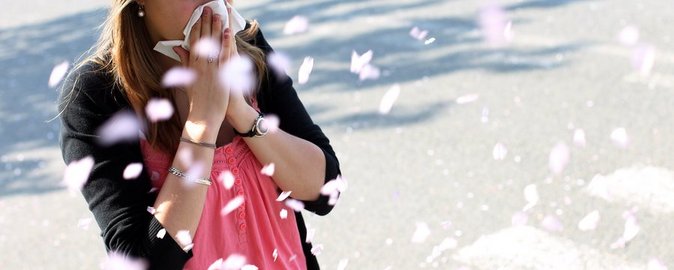- Education
-
Research
Current research
Talent
-
Collaboration
Businesses
Government agencies and institutions
Alumni
-
About AU
Organisation
Job at AU
One in five Danes suffers from an allergy. At Aarhus University and Aarhus University Hospital, researchers have identified a treatment which may be able to end the allergy pandemic.
2013.06.25 |

Alcohol makes you more prone to hay fever, because alcohol can dehydrate you, possibly exacerbating your reaction to pollen in the air.
Itching, red and irritated eyes, and a runny nose. It is the high season for pollen, and for the almost half a million Danes who suffer from a pollen allergy, getting through the summer can be difficult. Allergy is a widespread disease whose prevalence is increasing dramatically worldwide. Some people believe that what we are seeing is an allergy epidemic.
However, there is hope for the future. At least, research from Aarhus University, Aarhus University Hospital, shows that a new treatment may have a beneficial effect. The treatment is called intralymphatic immunotherapy.
“The treatment involves injecting a small amount of the allergen into the lymph node in the groin. The lymph node forms cells that produce antibodies, and if you then inject the allergen you want to be protected against, for example elm or grass, it produces a very strong response of protective antibodies, which means that the cells then find it much harder to recognise the allergen,” explains Professor Hans Jürgen Hoffmann.
The research shows that when the allergen is injected directly into the lymph node, the body is better protected against the allergic reaction, while the treatment is also much less time-consuming for the patient and has fewer side effects than other treatments.
“The treatment is performed over two months, with the patient being injected three times at monthly intervals,” says Hans Jürgen Hoffmann.
Today’s allergy treatments usually consist of tablets or injections that reduce the person’s hypersensitivity to allergens. However, it is a lengthy process.
“Today, patients can be vaccinated against allergies. This is a course of treatment that stretches over three years. For the first 16 weeks you have to show up once a week for an injection, and then every six to eight weeks for three to five years. However, only students and pensioners have the time for this sort of treatment. Finally, there is a new treatment, which involves taking a tablet every day for three years. But this can be hard to stick to,” says Hans Jürgen Hoffmann.
At the moment, seven patients are involved in a intralymphatic immunotherapy trial, and the researchers are expecting positive results in the form of fewer symptoms and less use of allergy drugs compared to previously. Next year the treatment will be tested on 36 participants to further test its efficacy. If everything goes according to expectations, it will be possible to offer the treatment from autumn 2014.
Professor Hans Jürgen Hoffmann
Aarhus University, Department of Clinical Medicine, and
Aarhus University Hospital, Department of Respiratory Medicine
Direct tel.: +45 7846 2107
Mobile tel.: +45 2818 8147
hans.jurgen.hoffmann@ki.au.dk